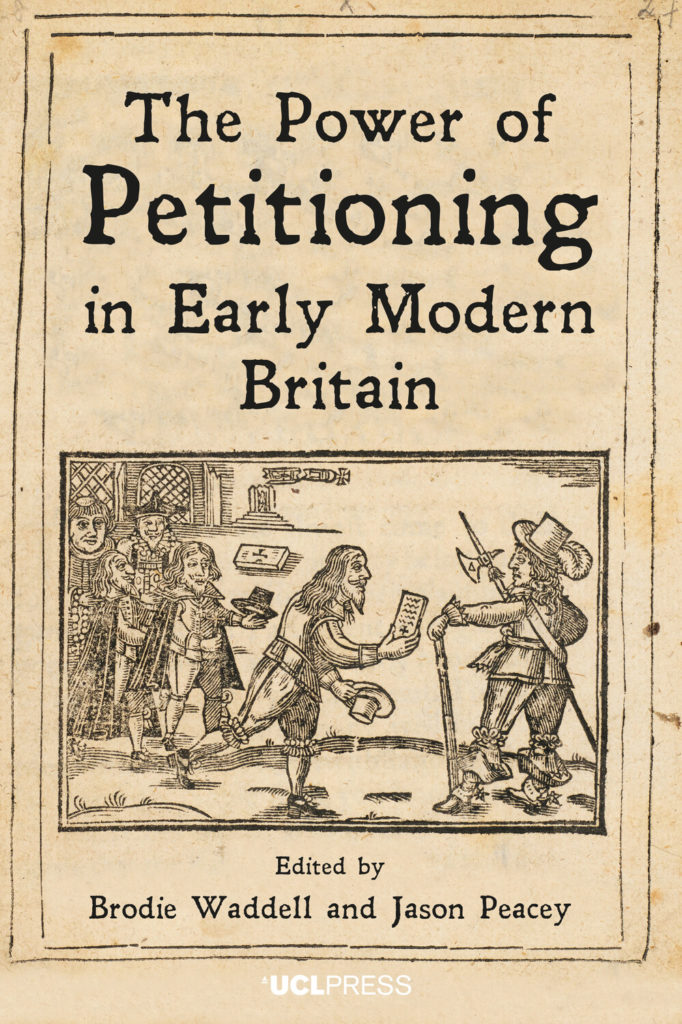Understanding politics and social relations in early modern Britain requires an appreciation of petitioning. In this period, ‘humble petitions’ were thoroughly commonplace, featuring prominently both in moments of national conflict, such as the Civil Wars or the Exclusion Crisis, and in everyday negotiations about taxation, welfare, and litigation. Historians encounter such documents – and responses to them – in almost every archive, whether in print or manuscript, and it is now a truism that petitioning was ubiquitous.
Recognising this ubiquity is vital to our appreciation of the hierarchical nature of past societies, but it is only a first step. To understand how governance operated and how politics was practised, it is necessary to examine supplicatory culture more closely.
To this end, we have just published a volume of essays bringing together scholars to analyse the nature, function, and impact of petitions in a variety of contexts and conjunctures: The Power of Petitioning in Early Modern Britain, ed. Brodie Waddell and Jason Peacey (UCL Press, May 2024).
Best of all, it is fully open access, so it can be read and downloaded for free by anyone with an interest in this period or in the history of petitioning.
This is the first co-authored peer-reviewed publication from our AHRC-funded project which ran from 2019 to 2021. We have already published seven volumes of transcribed petitions on British History Online, nearly 150 short investigations into seventeenth-century petitioners, a database of metadata for nearly 3,000 petitions, an annotated bibliography of key scholarship, and most recently Brodie Waddell’s article on ‘The Popular Politics of Local Petitioning in Early Modern England’ in the Journal of British Studies. All of these publications have been open access and we are very pleased to be able to continue this practice in our new volume of essays.
This volume emerged from a workshop held online in September 2020. We are extremely grateful to the contributors for joining that conversation at a very challenging time and for sticking with the project despite the many delays and disruptions over the years that have followed. We are particularly proud to have brought together historians with a diverse range of perspectives, including social and political history as well as English, Scottish and Welsh history. We hope that the table of contents showcases the great variety of ways that this important topic can be approached:
1 Introduction: power, processes and patterns in early modern petitioning
Brodie Waddell and Jason Peacey
2 Genre, authorship and authenticity in the petitions of Civil War veterans and widows from north Wales and the Marches
Lloyd Bowen
3 The process and practice of petitioning in early modern England
Hannah Worthen
4 ‘The universal cry of the kingdom’: petitions, privileges and the place of Parliament in early modern England
Jason Peacey
5 Gathering hands: political petitioning and participative subscription in post-Reformation Scotland
Karin Bowie
6 ‘For the dead Fathers sake’? Orphans, petitions and the British Civil Wars, 1647-1679
Imogen Peck
7 The edges of governance: contesting practices and principles of justice in seventeenth-century fen petitions
Elly Robson
8 Shaping the state from below: the rise of local petitioning in early modern England
Brodie Waddell
9 The local power of petitioning: petitions to Cheshire quarter sessions in context, c.1570-1800
Sharon Howard
10 Afterword
Ann Hughes
Each chapter offers a different way of thinking about how petitioning fit into early modern political culture, institutional change and state formation, while the co-authored introduction presents the first holistic overview of the variegated but interconnected landscape of supplicatory culture, challenging simplistic distinctions between different types of supplicant, between local and national petitioning, and between deferential and more defiant possibilities.
We hope you will dive into the book immediately, but we will also be publishing a series of very short interviews with contributors in the weeks ahead, providing hints of what you will find in each chapter. In the meantime, perhaps start with the introduction to learn more about early modern petitioners, their grievances and their impact on the world around them.

